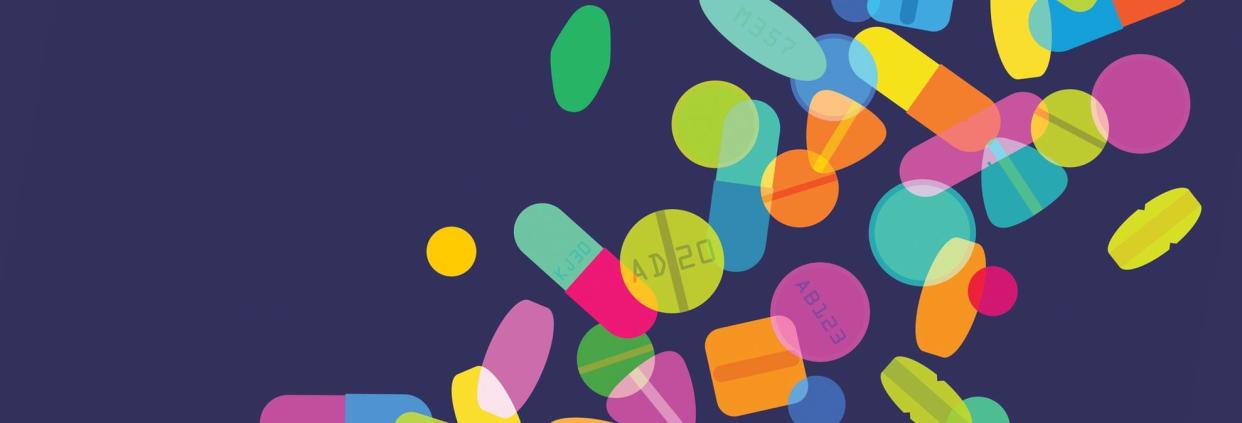How to Get Off Prescription Drugs

Consumer Reports has no financial relationship with advertisers on this site.
Whether you plan to stop taking a drug or just lower the dose, Consumer Reports’ medical director, Orly Avitzur, M.D., advises that you talk with your doctor about how to wean yourself.
That’s because abruptly quitting drugs can often trigger serious problems. For example, stopping many antidepressants, anti-anxiety drugs, heartburn meds, and sleeping pills can worsen the symptoms the medication was meant to treat.
And if you’ve been taking opioids such as OxyContin, Percocet, or Vicodin for more than a couple of weeks, going cold turkey can trigger withdrawal symptoms including anxiety, muscle aches, nausea, vomiting, diarrhea, and sleeplessness.
When making a plan to stop, here are some steps to take:

What he took: The stimulants Ritalin, Adderall, and Vyvanse to treat ADHD, and then four antidepressants to treat the side effects of the stimulants.
Why he wanted to stop: Soon after Bitzan was diagnosed with ADHD at age 13, his psychiatrists prescribed progressively higher doses of a stimulant to treat the condition, he says. When that triggered sleeplessness, anxiety, a racing heart, and shaking hands, doctors prescribed a series of antidepressants to counter the stimulant. But instead of calming him, they “just dampened my emotions,” Bitzan says. Then one day, while taking a test as an ultrasound technician student, Bitzan’s shaky hands caused him to fail the exam. “I’d never been so devastated in my life,” he says. “I knew I had to get off the medication.”
How he did it: Bitzan entered a prescription-drug-withdrawal program called Point of Return, which took five months. Being medication-free has changed his life, he says. “My sleep is much improved; I have a stable job,” he says. “I’m much happier.”

What she took: Prescription omeprazole (Prilosec) for heartburn.
Why she wanted to cut back: Prilosec, which belongs to a class of drugs called proton-pump inhibitors (PPIs), did help Loureiro’s heartburn. But over time she noticed that missing a dose triggered explosive chest pain. “It felt like a heart attack,” she says. Loureiro later learned that after just a few weeks on a PPI, missing a dose can cause the stomach to overproduce acid, triggering rebound symptoms that can include chest pain and nausea. Other research suggests that the drugs can increase the risk of C. difficile, a hard-to-treat gastrointestinal infection.
How she cut back: Twelve years after she started taking the drug, Jeana says she began a carefully calibrated program to slowly increase the time between doses until she eliminated it entirely, an approach that eases rebound symptoms. She says that eating a healthier diet helped her manage her heartburn without the PPIs. “Now that I’m off the medication,” Loureiro says, “I know my trigger foods and choose not to include them in my diet.”

What she took: Oxybutynin for an overactive bladder and sertraline (Zoloft) for anxiety.
Why she wanted to cut back: The drug for her overactive bladder gave her headaches, extreme dry mouth, and fatigue. Though the medication did cut down on a few bathroom trips, it wasn’t enough to outweigh the side effects, most of which her doctor never told her about, she says. Research shows that the drug is only moderately effective; most people, like Michaels, stop taking it after about 6 months. And with Zoloft, she says, “I put on 40 pounds and felt uneasy taking it long term. I wanted off.”
How she did it: After five months on oxybutynin, she opted for lifestyle changes, including drinking less caffeine and doing Kegel exercises to strengthen her bladder muscles. After she insisted that she also wanted to stop Zoloft, Michaels’ doctor advised weaning off the medication. Today, meditation and learning to communicate her emotions better have gone a long way to minimize her anxiety, she says.
—Additional reporting by Ginger Skinner
Editor's Note: This special report and supporting materials were made possible by a grant from the state Attorney General Consumer and Prescriber Education Grant Program, which is funded by a multistate settlement of consumer fraud claims regarding the marketing of the prescription drug Neurontin (gabapentin).
This article also appeared in the September 2017 issue of Consumer Reports magazine.
More from Consumer Reports:
Top pick tires for 2016
Best used cars for $25,000 and less
7 best mattresses for couples
Consumer Reports is an independent, nonprofit organization that works side by side with consumers to create a fairer, safer, and healthier world. CR does not endorse products or services, and does not accept advertising. Copyright © 2017, Consumer Reports, Inc.

